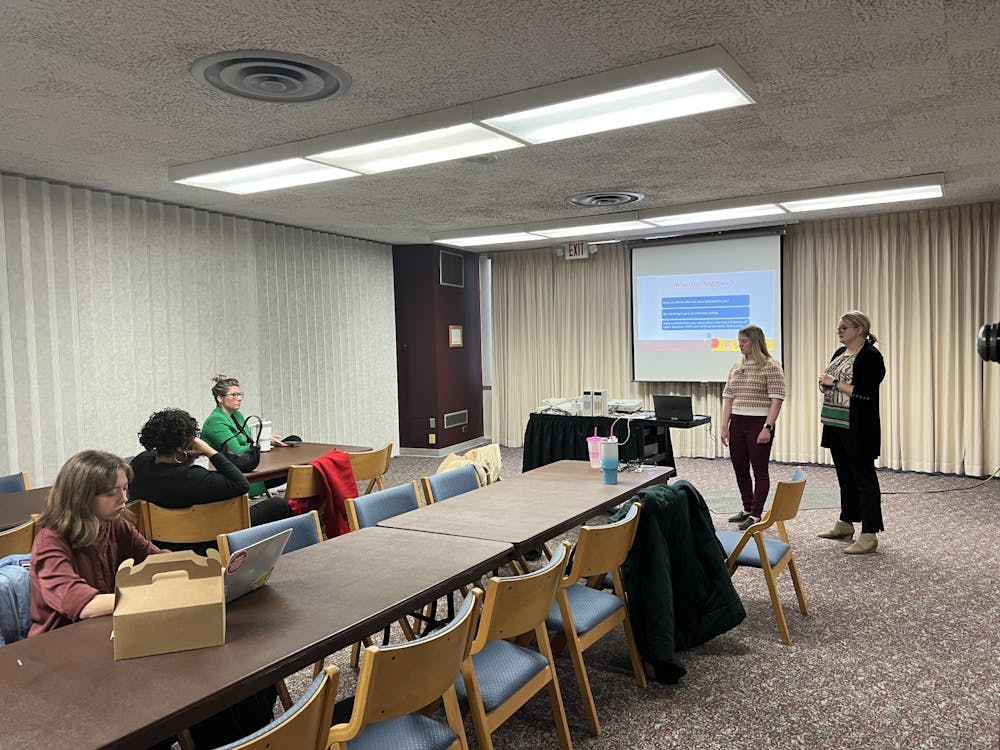Negotiating salaries for underrepresented communities, March 21

Kendall Perdue (left) and Erica O’Toole (right) discuss their presentation on Salary Negotiations for Underrepresented Communities.
From 12 to 1 p.m. on March 21 the Office of LGBTQ Services and Gender Equity Programs teamed with the Career Development Center to host Salary Negotiations for Underrepresented Communities with Career Services as part of the Women's History Month event calendar.
Located in Bovee University Center Rooms Gold 219 and Chippewa 220, students and faculty from across Central Michigan University’s campus came to talk about experiences of working within male-dominated fields. As stated on Engage Central, discussions included how to navigate these fields, negotiate salaries and advocate for yourself in the workplace.
“I think salary negotiation is important for everybody,” Associate Director of the Career Development Center Erica O’Toole said. “This is a very common thing in our world now, so having these skills is an important part of going into the workforce.”
According to Kendall Perdue, assistant director in the Career Development Center, event organizers wanted to turn this meeting into an inclusive space to discuss the salary negotiation process, specifically for underrepresented communities.
The start of the presentation focused on why underrepresented communities are less likely to negotiate than other communities, which the presentation described as individual barriers and organizational barriers.
Individual barriers focus more on an individual's negotiating skills and market salary knowledge while organizational barriers are based on things like gender bias or “Glass Windows.” According to the Merriam-Webster Dictionary, "Glass Windows" are "an intangible barrier within a hierarchy that prevents women or minorities from obtaining upper-level positions."
These barriers, whether individual or organizational are why it can be so important to have these types of conversations to help people be knowledgeable about the salary market, while also understanding salary negotiation tactics, as stated at the meeting.
“I think it's just an awkward conversation, kind of taboo so we don't really like to talk about it a lot,” O’Toole said.
The second half of the presentation focused mainly on negotiation tactics and how to best prepare yourself for job/salary negotiations. Using six steps, the hosts helped explain the entire negotiation process to the audience.
- STEP ONE: Understanding how employers determine salary
- STEP TWO: Research – Benchmarking your salary and benefits
- STEP THREE: Determine your priorities
- STEP FOUR: Know your value and strengths
- STEP FIVE: The Conversation– Begin your negotiation after conducting your research
- STEP SIX: Decide if you will accept the offer – Concluding the negotiation
As stated during the meeting, job and salary negotiations are something most people will have to go through at some point in their working life, and having this knowledge can be essential in improving your pay, benefits and/or job positions. However, according to O'Toole, it all starts with having the ability to campaign for yourself.
“Advocate for yourself,” O’Toole said. “It's really important to know your worth and your value when going into any type of job offer or job negotiation.”
As mentioned in the PowerPoint, many people are unaware of the market value of their work and that alone can be a cause for making below market salary.
Located in Ronan Hall 240, according to cmich.edu, the Career Development Center “guides students through the process of choosing a career and connects students and alumni with employers from across the country.”
“We do one on one appointments all the time,” O’Toole said. “Not just for salary negotiation, but resumes, cover letters, job search, networking, all of those areas.
“We're more than happy to sit down with students.”
According to the presentation, all employers benefit from employees NOT discussing their pay with each other. Working on becoming more comfortable having conversations regarding pay transparency and support between peers and colleagues can be essential in achieving fair and equal pay for all.
“There might be [benefits], you don't know if you don't ask them,” Perdue said. “A lot of it goes unsaid.”






